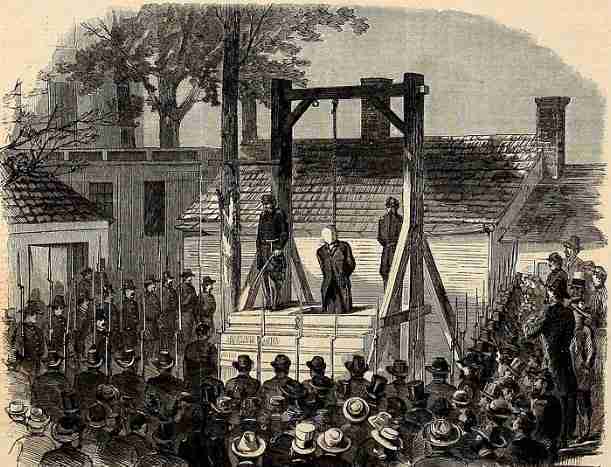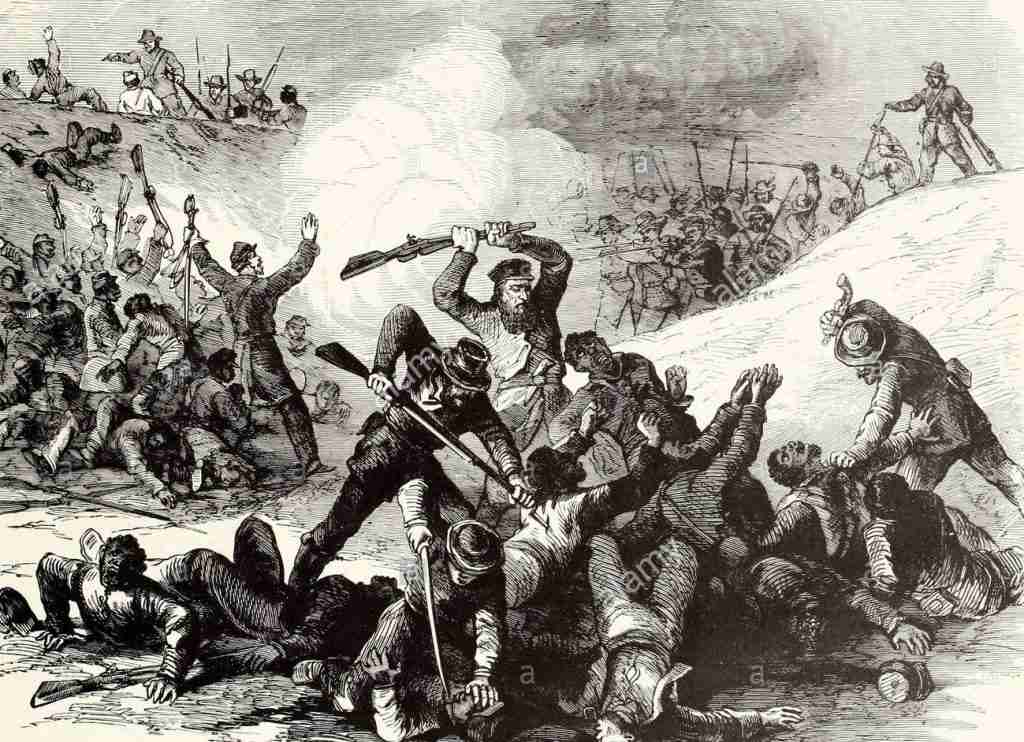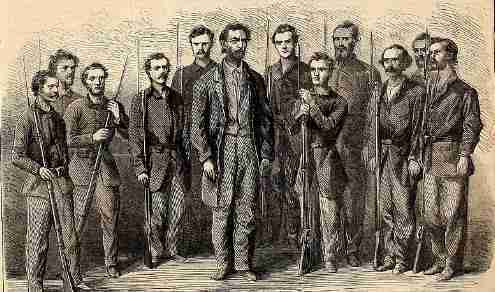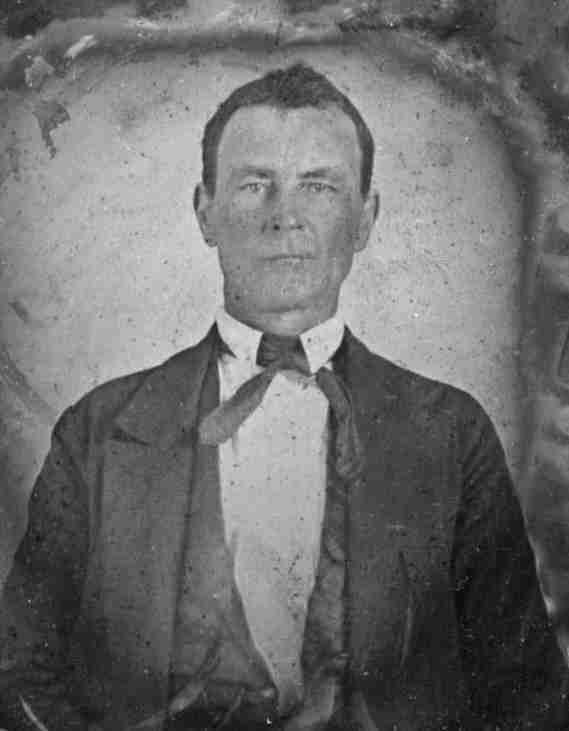Champ Ferguson: Confederate Guerrilla and War Criminal

During the Civil War, the lines between soldier and outlaw blurred in the mountains of Appalachia, where men like Champ Ferguson thrived. Ferguson wasn’t a typical Confederate soldier; he was a guerrilla fighter, leading a small band of men in bloody raids that left a trail of death and fear. While many on both sides of the conflict engaged in brutality, Ferguson’s crimes, particularly those committed after the Battle of Saltville, stand out for their sheer savagery. His war crimes eventually led to his capture, trial, and hanging, making him one of the few Confederates executed for his wartime actions.
Champ Ferguson’s Journey From Farmer to Fighter
Champ Ferguson wasn’t born into violence, but his life seemed to be heading that way long before the Civil War broke out. He grew up in the backwoods of Tennessee, where disputes were often settled with fists, knives, or guns. By the time war came, Ferguson had developed a deep-seated hatred for Union supporters, many of whom lived in the nearby hills. Some say personal grudges pushed him into the conflict, while others argue it was simply the chaos of the time that led Ferguson to take up arms. Either way, his transition from farmer to Confederate guerrilla came quickly, and his reputation for violence grew just as fast.
Guerrilla warfare wasn’t like the battles you read about in history books, where lines of soldiers faced each other on open fields. Instead, it was hit-and-run tactics, ambushes, and raids—often targeting civilians as much as soldiers. Ferguson thrived in this environment, leading a group of men through the hills of Kentucky and Tennessee, raiding Unionist homes and murdering those who supported the North. His brutality was infamous, even among his Confederate comrades, and his actions became even more chilling as the war dragged on.

The Bloodbath at Saltville
Ferguson’s most infamous act came during and after the Battle of Saltville in October 1864. Saltville, Virginia, was home to one of the Confederacy’s most essential saltworks, and Union forces were determined to capture it. The battle was brutal, with Confederate troops defeating the Union cavalry that tried to seize the town. But it wasn’t the fighting during the battle that made headlines; it was what happened afterward.
Following the Confederate victory, Ferguson and his men went to work. Instead of tending to the wounded or taking prisoners, Ferguson reportedly went through the battlefield, murdering wounded Union soldiers where they lay. His victims included African American troops who had been part of the Union force. Eyewitnesses recounted how Ferguson walked among the dead and dying, selecting his victims with cold, deliberate cruelty. This wasn’t the heat of battle—this was cold-blooded murder.
Ferguson’s actions at Saltville were so brutal that even some Confederates were shocked. His killing spree wasn’t about military strategy or necessity—it was personal. He saw the Union soldiers, mainly the formerly enslaved troops, as enemies who deserved no mercy. For Ferguson, the war wasn’t just a battle for the future of the South; it was an opportunity to settle scores and take out his rage on anyone he saw as an enemy.
Champ Ferguson’s Trail of Crimes
Saltville wasn’t the first time Ferguson had been accused of atrocities, but it was the event that sealed his fate. Throughout the war, he had been responsible for the deaths of dozens, maybe hundreds, of Union sympathizers and soldiers. His method was always the same: swift, brutal, and merciless. He was a guerrilla in the truest sense, blending in with the local population, striking quickly, and disappearing into the hills.
Ferguson’s reign of terror extended far beyond the battlefields. He targeted civilians, especially those he suspected of aiding the Union cause. His reputation was one of fear, and even those who supported the Confederacy kept their distance from him. He wasn’t a man bound by military codes or the rules of engagement; Ferguson operated on his own terms, and his terms were violence and retribution.

The Long Arm of Justice
As the war ended, Ferguson’s crimes didn’t go unpunished. The Union had kept track of his activities, and after the Confederate surrender, Ferguson was arrested in 1865. His capture wasn’t the result of some heroic chase through the mountains but rather a quiet arrest as the Confederacy crumbled. Ferguson, who had lived by the sword for so long, would now face the consequences of his actions.
His trial took place in Nashville, and it was one of the most significant of the post-war period. Ferguson was charged with over 50 counts of murder, and his trial became a media sensation. The evidence against him was overwhelming—witness after witness came forward to testify about his brutal killings. Ferguson, however, remained defiant. He claimed he had only been defending himself, that the killings were a necessary part of the war, or that he had acted on orders from Confederate commanders. But the jury didn’t buy it.
Ferguson’s defense might have worked for a regular soldier—after all, many men on both sides had killed during the war. But Ferguson wasn’t just any soldier. His crimes, especially the murders of wounded men at Saltville, were beyond the pale, even in the brutal context of the Civil War. He wasn’t a soldier following orders; he was a killer taking advantage of a war to settle personal grudges.
The Hangman’s Noose
In the end, the jury found Ferguson guilty, and he was sentenced to hang. On October 20, 1865, Ferguson faced the gallows. As he stood there, waiting for the noose to be placed around his neck, he remained unapologetic. Some reports claim that Ferguson regretted his actions, while others say he stayed defiant until the end. Either way, Champ Ferguson became one of the few Confederate fighters to be executed for war crimes.
His hanging marked the end of a violent chapter in Civil War history, but Ferguson’s story didn’t die with him. He became a symbol of the dark side of guerrilla warfare, a reminder of the chaos and brutality that tore the Appalachian region apart during the war. Some saw him as a hero who fought for the Confederacy with ruthless determination. Others, especially those who had lost loved ones to his violence, saw him as nothing more than a murderer who finally got what he deserved.

The Legacy of Champ Ferguson
Today, Champ Ferguson remains a controversial figure in the history of the Civil War. In some parts of the South, his name is remembered with a certain respect as a man who fought for his cause without mercy. But in the hills of Tennessee and Kentucky, where his raids left families shattered, Ferguson’s name is a reminder of the darker side of the conflict.
The Battle of Saltville and Ferguson’s war crimes there stand out as a stark example of how the Civil War wasn’t just fought on battlefields but in the hearts and minds of ordinary people. The war was personal for Ferguson, and he made it personal for everyone around him. His story is a chilling reminder of the brutality that can come when war turns neighbor against neighbor and when the rules of warfare give way to the desire for revenge.
In the end, Champ Ferguson wasn’t just a war criminal—he was a product of the chaotic, violent times in which he lived. His capture and hanging brought some measure of justice. Still, the scars he left on the people of Appalachia lingered long after the war was over.


Comments are closed.